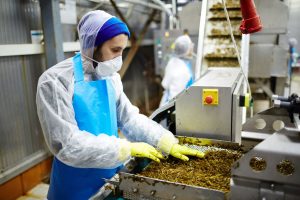WorkSafeBC and industry groups are working to ensure COVID-19 health and safety in food processing plants.

Photo credit: iStock.com/Shironosov
Industry sectors most affected by COVID-19 are being supported to minimize the spread of the virus. One high-risk sector is food processing.
B.C. food processing employers are working hard to update their COVID-19 safety plans and improve protocols for preventing virus transmission in their workplaces. WorkSafeBC has increased inspections (see this story in the Vancouver Sun) and has a webpage with detailed protocols for meat processing facilities.
The Manufacturing Safety Alliance of BC (the Alliance; the health and safety association for manufacturers and food processors in our province) provides COVID-19 resources specifically for manufacturing and food processing employers. For example, in December a virtual town hall was co-hosted by the Alliance and the Fraser Health Authority.
During the town hall, Dr. Emily Newhouse, a medical health officer with Fraser Health, answered questions from employers on topics such as worker health screening, use of PPE, and training. Said Dr. Newhouse, “There is light on the horizon, and I know that with hard work, we can minimize spread in those workplaces.”
You can read the questions and answers, and watch a recording of the event, on the Alliance website, at Navigating the 2nd Wave of the Pandemic.
Facing challenges
“As in other manufacturing industries, food processors face space constraints on some production lines that may make physical distancing a challenge,” says Lisa McGuire, CEO of the Alliance, who hosted the town hall. She also says that language barriers often present challenges for training and communications.
The Alliance is helping employers review their existing COVID-19 safety plans. They’re also helping to ensure that the controls in place remain effective and comprehensive, and that staff follow protocols. They outline important “layers of protection” that include:
- Placing barriers between work areas, and between lunch tables
- Hanging pastic sheets between workers in production areas
- Training workers on COVID-19 safety protocols and procedures
- Installing additional hand washing and sanitizing stations
- Providing personal protective equipment like masks and gloves
“Employers in this sector have committed significant time and financial investment in controls to protect workers and safeguard our food supply,” McGuire adds. “But it has taken employees at all levels working together to keep the virus out and the lights on.”
Thank you to essential workers in the food supply chain
Let’s take a moment to appreciate essential workers in the food supply chain, who have been on the job throughout the pandemic. (For example, see my post Delivering safety in busy warehouses during the pandemic.)
These workers did not have the option of working from home. They work on the processing lines every day, filling our grocery shelves. We owe them a lot of gratitude — they are heroes of the pandemic who deserve to be recognized.


